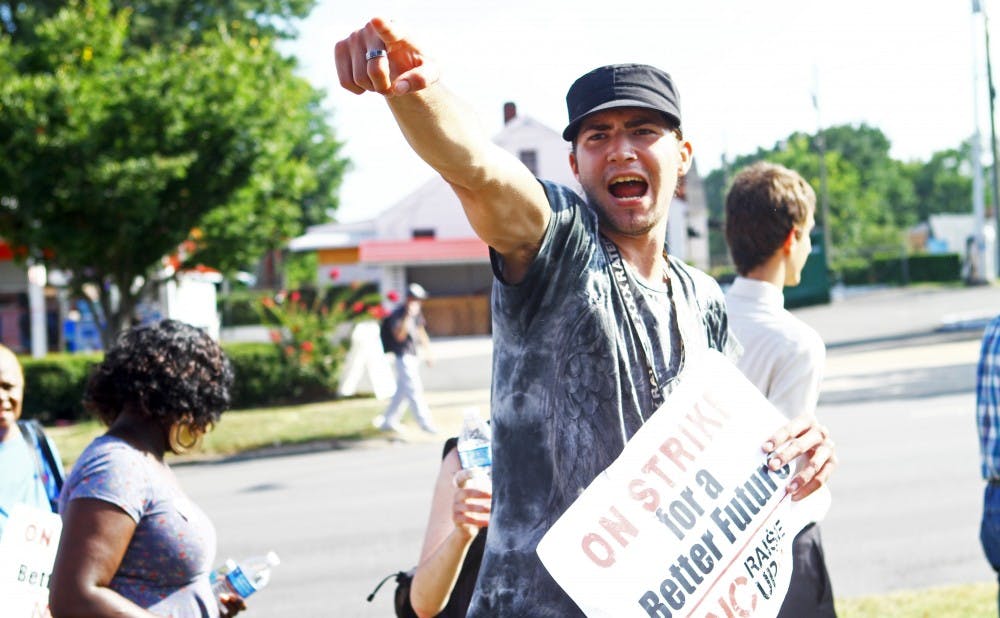RALEIGH—Fast food workers across the state walked off their jobs Thursday as part of a national movement to demand a $15 minimum wage and the right to form a union.
Workers for popular chain restaurants such as Burger King, McDonalds and Bojangles protested their low wages in Durham, Raleigh, Greensboro and Charlotte over the course of the day, culminating in a march through Raleigh and an address by North Carolina NAACP President Rev. William Barber, Divinity '89. The protestors, ranging from five to 80 years old, called for fair wages that would allow them to raise a family.
“So many people are fed up. So many people are struggling to get by in the richest country in the world,” said MaryBe McMillan, secretary-treasurer of the North Carolina State American Federation of Labor and Congress of Industrial Organizations.
About 20 protesters started the day off in Durham at 6 a.m., chanting and holding signs in front of Burger King as cars passed by and honked in support.
Chants of “We can’t survive on $7.25” blasted through the quiet morning hours, a reference to the current wages of fast food workers such as Durham Burger King employee Marcel McGirk.
McGirk noted that despite his 14 years of experience in fast food—including working as a manager at multiple establishments—he is currently paid the same amount as someone on their second day of work.
“We’re working hard to get paid nothing,” McGirk said. “I’m 26 years old, I have bills.”
Corey Munlyn said his pay was only 20 cents above the norm and yet he often performed tasks himself without other staff.
“I feel like it’s not adding up, with countless days [of me] working by myself,” Munlyn said.
Workers inside the Burger King next to the protest declined to comment on the strike.
Raleigh’s event began at the Martin Street Baptist Church, where strikers held signs sporting slogans like, “We are worth more” and “Labor rights are human rights.” Approximately 70 to 80 people walked through a section of the city, eventually stopping directly in front of the local Kentucky Fried Chicken franchise, where Barber gave a keynote speech to the surrounding supporters. Barber used the Bible to substantiate his claims, gesticulating passionately and dripping with sweat on the bright and hot day.
“You have a right to demand to be treated right,” Barber said. “God says you have a right to demand to be paid right.”
Barber’s fervent 20-minute speech at a temporary podium outside KFC argued for better wages and working conditions for the strikers as based on their constitutional rights, economic viability and value as equal human beings.
“All people have a right to economic initiatives... they have a right to just wages, they have a right to benefit and they have a right to decent working conditions," he said. "Anything less than that is sin."
In an interview after his speech, Barber said the current state of worker wages lacks economic sense because North Carolina has the second highest concentration of people working in fast food chains, noting that the state has a lower minimum wage than the national average.
"North Carolina has a constitution that says people have a right to the fruit of their labor,” Barber said. “That’s not something someone came up with—that’s been in our constitution for years. White people, black people understood work without wages and benefits is just a form of slavery.”
Allan Freyer, Trinity '99 and a public policy analyst at the North Carolina Justice Center, echoed Barber’s view in saying that a higher minimum wage is not only in the interest of the workers themselves, but also in the interest of stimulating the economy.
“These are companies that certainly have the ability to pay their workers more without necessarily impacting prices,” Freyer said. “The overwhelming majority of research shows that raising the living wage has actually caused greater economic growth and personal income growth than in states that did not.”
McMillan noted that financial difficulties for workers are only exacerbated by the North Carolina government.
“I think a lot of people don’t realize just how many more jobs that are coming into our economy are low wage service sector jobs,” said McMillan. “It’s always been a struggle for workers in North Carolina. We’re the least unionized state, we’ve never had collective bargaining rights for public employees.
McMillan said that AFL-CIO and supporters of the strike campaign have approached members of the state legislature, sending members of the organization to call and approach legislators about keeping unemployment benefits and approving the Affordable Care Act’s expansions to Medicare.
A law decreasing the amount of benefits the unemployed receive, such as lowering maximum benefits from $535 per week to $350 per week, was passed this summer and took effect July 1.
“It’s an uphill fight, but I’m more hopeful than I’ve been in a long time,” McMillan said.
Get The Chronicle straight to your inbox
Signup for our weekly newsletter. Cancel at any time.

